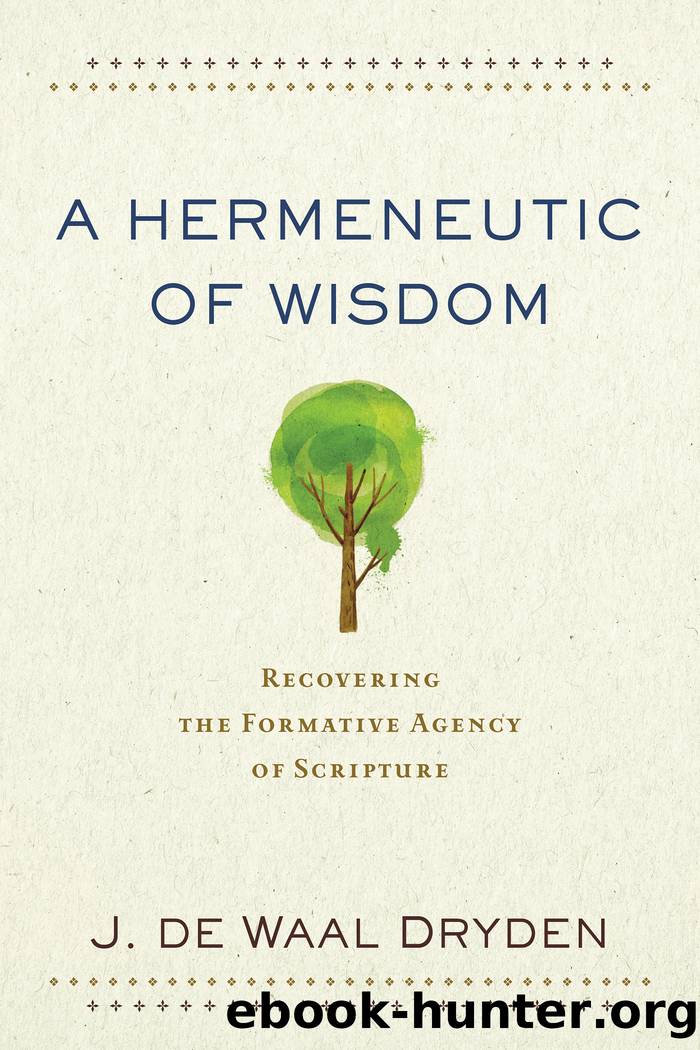A Hermeneutic of Wisdom by J. de Waal Dryden

Author:J. de Waal Dryden
Language: eng
Format: epub
Tags: Hermeneutics;Bible (New Testament—Hermeneutics);Bible (New Testament—Criticism |;interpretation | etc;Wisdom—Biblical teaching;REL006400;REL006080
ISBN: 9781493414406
Publisher: Baker Publishing Group
Published: 2018-05-22T00:00:00+00:00
Matthew 5:3â12: The Beatitudes
Of course one of the most obvious ways in which the Gospels teach wisdom is in their transmission of the teachings of Jesus, which invariably reflect the wisdom intention of shaping followers in their deepest convictions and desires. The most famous collection of Jesusâs public discourses is found in the Sermon on the Mount in Matthew 5â7. A treatment of the whole Sermon is beyond the scope of this work;32 a look at the Beatitudes, which introduce the Sermon, will have to suffice.
Like so many areas of biblical research, the large volume of work written about the Beatitudes and the Sermon on the Mount has, unfortunately, not furnished us with a consensus interpretation but only deepened controversies. The chief interpretive controversies for the Beatitudes are symptoms of the dichotomies of law/gospel and indicative/imperative, which we dealt with in chapters 2 and 3. As David Turner explains: âThere are two contrasting views on the meanings of the Beatitudes. One sees them as indicative pronouncements of gracious kingdom blessings. The other sees them as ethical exhortations about entrance requirements (Guelich 1976). If the latter view is correct, human effort must produce the characteristics mentioned here so that one might earn Godâs approval. If the former view is correct, one can only thankfully acknowledge these characteristics as evidence of Godâs gracious working in oneâs life and cultivate them as one lives as a disciple of Christ.â33 Here we have a classic law/gospel paradigm: the Beatitudes (and the rest of the Sermon) have to be understood as either promise or demand. Either they are obeyed to earn favor with God, or they are gifts to be received with thanksgiving.34 As Turner goes on to say, âThe Beatitudes reveal key character traits that God approves in his people. These character traits are gracious gifts indicating Godâs approval, not requirements or works that merit Godâs approval.â35
The problem with this approach is how quickly it turns into nonsense in the Sermon. In 5:20 when Jesus says, âFor I tell you, unless your righteousness exceeds that of the scribes and Pharisees, you will never enter the kingdom of heaven,â he means exactly what he says. The righteousness he speaks of is not imputed but one realized in the lives of his disciples.36 The question of whether righteousness is the free gift of God or the demand of God is foreign to Jesusâs logic in the Sermon. The righteousness Jesus demands is something inherent to the proclamation of the eschatological gift of the kingdom of heaven in which the rule of God is made manifest. The law/gospel dichotomy, while it has a use in certain contexts, only occludes our vision when we come to the Beatitudes and the Sermon on the Mount.37 As Ulrich Luz rightly says: âThe obvious question for Protestants is whether there is not then a âlegalistic interpretation . . . which makes the gifts of the kingdom of God dependent on the personâs moral capacity.â Matthew obviously did not have this concern.
Download
This site does not store any files on its server. We only index and link to content provided by other sites. Please contact the content providers to delete copyright contents if any and email us, we'll remove relevant links or contents immediately.
| Exegesis & Hermeneutics | New Testament |
| Old Testament |
The Five People You Meet in Heaven by Mitch Albom(3460)
Real Sex by Lauren F. Winner(2950)
Name Book, The: Over 10,000 Names--Their Meanings, Origins, and Spiritual Significance by Astoria Dorothy(2926)
The Secret Power of Speaking God's Word by Joyce Meyer(2923)
The Holy Spirit by Billy Graham(2880)
0041152001443424520 .pdf by Unknown(2771)
ESV Study Bible by Crossway(2725)
How The Mind Works by Steven Pinker(2714)
Ancient Worlds by Michael Scott(2607)
The ESV Study Bible by Crossway Bibles(2496)
Churchill by Paul Johnson(2493)
The Meaning of the Library by unknow(2486)
The Gnostic Gospels by Pagels Elaine(2459)
MOSES THE EGYPTIAN by Jan Assmann(2360)
City of Stairs by Robert Jackson Bennett(2295)
Jesus by Paul Johnson(2294)
The Complete Dead Sea Scrolls in English (7th Edition) (Penguin Classics) by Geza Vermes(2222)
Ancient Near Eastern Thought and the Old Testament by John H. Walton(2183)
The Nativity by Geza Vermes(2165)
